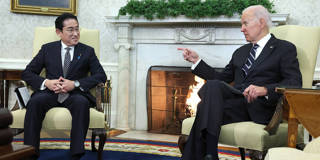 Kevin Dietsch/Getty Images
Kevin Dietsch/Getty Images
日本的战略要务
坎布里奇——去年12月,日本首相岸田文雄宣布了自1945年日本自卫队成立以来最雄心勃勃的军力扩张计划。日本国防开支将升至GDP的2%——两倍于1976年以来1%的水平。未来几年,日本将用于自保的所有外交、经济、技术和军事手段全部罗列在一项新的国家安全战略中。
https://prosyn.org/ZlZkRX3zh
To continue reading, register now. It’s free!
Register Now
Already have an account?
Log in



坎布里奇——去年12月,日本首相岸田文雄宣布了自1945年日本自卫队成立以来最雄心勃勃的军力扩张计划。日本国防开支将升至GDP的2%——两倍于1976年以来1%的水平。未来几年,日本将用于自保的所有外交、经济、技术和军事手段全部罗列在一项新的国家安全战略中。